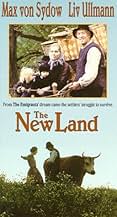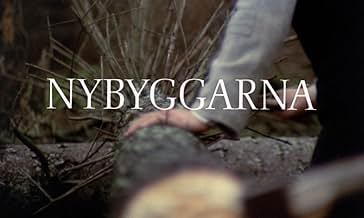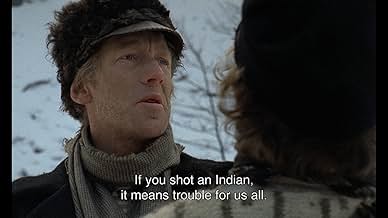CALIFICACIÓN DE IMDb
8.0/10
5.7 k
TU CALIFICACIÓN
Agrega una trama en tu idiomaA Swedish immigrant family struggle to establish a new life for themselves in 1850s Minnesota.A Swedish immigrant family struggle to establish a new life for themselves in 1850s Minnesota.A Swedish immigrant family struggle to establish a new life for themselves in 1850s Minnesota.
- Dirección
- Guionistas
- Elenco
- Nominado a 1 premio Óscar
- 9 premios ganados y 1 nominación en total
Karin Nordström
- Judit, hans hustru
- (as Karin Nordström-Järegård)
- Dirección
- Guionistas
- Todo el elenco y el equipo
- Producción, taquilla y más en IMDbPro
Opiniones destacadas
Part 2 of The Emigrants/ The New Land duology (I'm not sure what to collectively call them?) is just as well-made and as emotionally harrowing as the first, but in a different way. The Emigrants naturally dealt with the main characters making a difficult journey from Sweden to the U. S. in the 19th century, with The New Land seeing them settled down and trying to make the most of life in... well, a new land. Naturally, things aren't as great as they hoped it all would be, and the various challenges the characters are put through end up making this a challenging watch for the audience.
It's not challenging because it's boring or slow, though - more so that it's heavy-going and quite brutal in places. It's also over three hours long, which I know probably already makes it a no-go film for a good many people. It's actually very easy to appreciate all the stuff this does well, because the acting's great, it's visually excellent, and there are some really inspired editing choices in this as well (so it's not surprising to see in the credits that the director and editor are one and the same: Jan Troell).
These two films end up being about six and a half hours long, and together tell a difficult but engaging story about Swedish/American history, and the plight of an emigrant family plus all the challenges that come with both travel and settling. Not the easiest two-part film in the world to recommend, but it makes for a compelling epic that should deliver for those who find the idea of watching such a film intriguing.
It's not challenging because it's boring or slow, though - more so that it's heavy-going and quite brutal in places. It's also over three hours long, which I know probably already makes it a no-go film for a good many people. It's actually very easy to appreciate all the stuff this does well, because the acting's great, it's visually excellent, and there are some really inspired editing choices in this as well (so it's not surprising to see in the credits that the director and editor are one and the same: Jan Troell).
These two films end up being about six and a half hours long, and together tell a difficult but engaging story about Swedish/American history, and the plight of an emigrant family plus all the challenges that come with both travel and settling. Not the easiest two-part film in the world to recommend, but it makes for a compelling epic that should deliver for those who find the idea of watching such a film intriguing.
Picking up right where 'The Emigrants' left off, this film tells the story of an Swedish farming family who have staked out a claim and being their life anew in Minnesota. It's done in a highly realistic way, and we really feel the struggle of building a house, clearing the land, facing language difficulties, enduring the cold of winter, not having much money, and the possibly mortal threat of sicknesses. While it's giving us 1850's rural life in an authentic way, without a lot of glitz and a slower pace coming along as a part of that, it somehow does so without ever lagging over its 200+ minute run time, at least for me.
The story-telling a little more disjoint in this film, giving us bits of life in America almost as if in chapters, some parts of which we see once and then are never mentioned again. One example is the family's neighbors chastising them for their friendship with the former prostitute Ulrika (Monica Zetterlund), who has married a Baptist minister and converted to that faith, which they see as sacrilegious, and failing to note the irony in this view, given their own persecution prior to emigrating. It's a powerful scene, but nothing more comes of it. Similarly, we see a brief interval where Karl-Oscar (Max von Sydow) faces the possibility of going off to fight in America's Civil War after having been in the country for less than ten years, a perspective which was fascinating to me, but after he's rejected because of a limp, we hear nothing more about the distant fighting. Maybe this is like life.
Director Jan Troell is more daring stylistically during the flashback sequence involving the brother (Eddie Axberg), who goes off with a friend (Pierre Lindstedt) to try to find gold in California. Without spoiling anything, the surreal way he portrays this amplifies their harrowing ordeal, and I liked how the story behind how he returns with so much money is revealed.
The cast is wonderful, led by von Sydow and Liv Ullmann who have several great scenes. In one of the difficult moments, we see the attitude towards women in the period shown when she's told that getting pregnant again might prove fatal to her given past complications. She feels immense sadness over this because she feels like she wouldn't be a wife if this is true, and in turn, that she wouldn't be able to sleep with her husband if she couldn't risk pregnancy.
Unlike 'The Emigants', there is acknowledgment that the land these Swedish-Americans are farming was stolen from the Native Americans, but this is a film that is definitely told from a European perspective. Karl-Oscar defends himself, and we sympathize with him - he had no part in any of that, paid the government for the land, and has put in a lot of toil. We don't see any of the atrocities that the white settlers or the government committed, but we see some horrifying things the native Sioux do when backed into a corner and starving. One of the acts done after the killing of an entire white family is so brutally heinous, cruel, and disgusting that it seems to justify the mass hanging of Native Americans which follows. The events seem to be based loosely on the events of the Sioux Uprising in 1862, which led to the mass hanging of 38 Sioux in Minnesota. Still, I give the film credit for directly confronting the moral dilemma, though I struggle, wondering if there is an element here that is in a small way accepting one of America's two original sins. The film successfully strives for honesty through the lens of this family, achieves that, shows us just how hard life was in this period, and lets the viewer then grapple with what it all means. It made me think of the quote from Joyce, History is a nightmare from which I am trying to awake.
The story-telling a little more disjoint in this film, giving us bits of life in America almost as if in chapters, some parts of which we see once and then are never mentioned again. One example is the family's neighbors chastising them for their friendship with the former prostitute Ulrika (Monica Zetterlund), who has married a Baptist minister and converted to that faith, which they see as sacrilegious, and failing to note the irony in this view, given their own persecution prior to emigrating. It's a powerful scene, but nothing more comes of it. Similarly, we see a brief interval where Karl-Oscar (Max von Sydow) faces the possibility of going off to fight in America's Civil War after having been in the country for less than ten years, a perspective which was fascinating to me, but after he's rejected because of a limp, we hear nothing more about the distant fighting. Maybe this is like life.
Director Jan Troell is more daring stylistically during the flashback sequence involving the brother (Eddie Axberg), who goes off with a friend (Pierre Lindstedt) to try to find gold in California. Without spoiling anything, the surreal way he portrays this amplifies their harrowing ordeal, and I liked how the story behind how he returns with so much money is revealed.
The cast is wonderful, led by von Sydow and Liv Ullmann who have several great scenes. In one of the difficult moments, we see the attitude towards women in the period shown when she's told that getting pregnant again might prove fatal to her given past complications. She feels immense sadness over this because she feels like she wouldn't be a wife if this is true, and in turn, that she wouldn't be able to sleep with her husband if she couldn't risk pregnancy.
Unlike 'The Emigants', there is acknowledgment that the land these Swedish-Americans are farming was stolen from the Native Americans, but this is a film that is definitely told from a European perspective. Karl-Oscar defends himself, and we sympathize with him - he had no part in any of that, paid the government for the land, and has put in a lot of toil. We don't see any of the atrocities that the white settlers or the government committed, but we see some horrifying things the native Sioux do when backed into a corner and starving. One of the acts done after the killing of an entire white family is so brutally heinous, cruel, and disgusting that it seems to justify the mass hanging of Native Americans which follows. The events seem to be based loosely on the events of the Sioux Uprising in 1862, which led to the mass hanging of 38 Sioux in Minnesota. Still, I give the film credit for directly confronting the moral dilemma, though I struggle, wondering if there is an element here that is in a small way accepting one of America's two original sins. The film successfully strives for honesty through the lens of this family, achieves that, shows us just how hard life was in this period, and lets the viewer then grapple with what it all means. It made me think of the quote from Joyce, History is a nightmare from which I am trying to awake.
I watched this the day after watching The Emigrants. They're really one film cut into two very long halves. I suppose Kill Bill 2 also is a standalone movie, but no one would recommend seeing only that and not watching Kill Bill 1. It's the same for The Emigrants and The New Land. Certain relationships in this movie only have power because of the backstory found in The Emigrants, such as Robert and Arvid's close friendship, why Kristina is so attached to Kristina despite religious differences, and even why Uncle Danjel is relevant.
The cinematography in this film felt more jarring and experimental, particularly with respect to Robert's trip out west. The movie is incredibly long and drawn out, and the timeline can be hard to pinpoint. An hour may be spent on days or weeks and then years suddenly pass between camera cuts.
This film does excel at showing both the impact of loss and how commonplace death was on the frontier. Danger never was far away, and seemingly distant occurrences suddenly could have local impact, whether the Civil War or strife with the Indian tribes. The New Land a pretty good film, but it suffers even more so than The Emigrants from overlength and without quite as much punch.
The cinematography in this film felt more jarring and experimental, particularly with respect to Robert's trip out west. The movie is incredibly long and drawn out, and the timeline can be hard to pinpoint. An hour may be spent on days or weeks and then years suddenly pass between camera cuts.
This film does excel at showing both the impact of loss and how commonplace death was on the frontier. Danger never was far away, and seemingly distant occurrences suddenly could have local impact, whether the Civil War or strife with the Indian tribes. The New Land a pretty good film, but it suffers even more so than The Emigrants from overlength and without quite as much punch.
"The New Land" is the second half of a story started in Troell's "The Emigrants," which depicted the struggles of a band of Swedish peasants in their move to America. Here, several of the settlers- such as the priest and the prostitute- move away in the first half-hour and reappear here and there throughout the rest of the film. The plot focuses on Karl-Oscar, his wife Kristina, and the family they try to raise in the Minnesota wilderness.
Von Sydow and Ullmann are given a chance to embellish on their characters, and they both do excellent work. Axberg also does a fine job of lending more depth to the character of Robert, Karl-Oscar's rebellious younger brother. There is also material worked in that examines the mistreatment (and eventual uprising) of local Native Americans and the futile searches for gold in the north. These other elements do not always seem to fit with the central story, but they effectively add to the sense of time and place anyway.
"The New Land" does not have the same emotional impact that "The Emigrants" had, but it develops the two central characters more and intelligently explores how they learn to adapt to their new life. Put together, these two films convincingly illustrate the plight of those who forged our frontier.
Von Sydow and Ullmann are given a chance to embellish on their characters, and they both do excellent work. Axberg also does a fine job of lending more depth to the character of Robert, Karl-Oscar's rebellious younger brother. There is also material worked in that examines the mistreatment (and eventual uprising) of local Native Americans and the futile searches for gold in the north. These other elements do not always seem to fit with the central story, but they effectively add to the sense of time and place anyway.
"The New Land" does not have the same emotional impact that "The Emigrants" had, but it develops the two central characters more and intelligently explores how they learn to adapt to their new life. Put together, these two films convincingly illustrate the plight of those who forged our frontier.
¿Sabías que…?
- TriviaThe movie and its prequel Los emigrantes (1971) were Oscar nominated on the same year (1972), though in different categories. This is the first and only occurrence of such an event.
- ErroresIn one of the first scenes, when Karl Oskar is taking the family to the new settlement, the boom mic is visible in the upper left corner for the entire shot.
- Citas
Karl-Oskar: Kristina, do you remember when we moved here last fall, you said it was almost as pretty as back home in Duvemåla? Maybe we could call our home here Duvemåla. What do you say to that? Or New Duvemåla.
Kristina: Just think, that I - Duvemåla.
Karl-Oskar: Yeah.
Kristina: Then we don't live at Ki-Chi-Saga any more. We live at Duvemåla.
- Versiones alternativasThe USA television version, called "The Emigrant Saga" consists of this film plus its prequel, Los emigrantes (1971), joined and re-edited together in chronological order and dubbed in English.
- ConexionesFeatured in Stjärnbilder (1996)
Selecciones populares
Inicia sesión para calificar y agrega a la lista de videos para obtener recomendaciones personalizadas
- How long is The New Land?Con tecnología de Alexa
Detalles
Contribuir a esta página
Sugiere una edición o agrega el contenido que falta

Principales brechas de datos
By what name was Nybyggarna (1972) officially released in India in English?
Responda






























